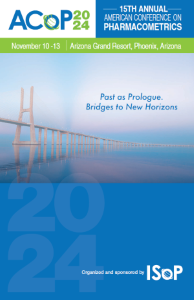Workshop
Practical Tools for Model Calibration with SimBiology, MathWorks
Saturday, November 9, 2024
1:00 PM – 5:00 PM MST
Location: Ocotillo B
- FB
Fulden Buyukozturk, PhD
Principal Engineer
MathWorks, California, United StatesDisclosure information not submitted.
Speaker(s)
Practical Tools for Model Calibration with SimBiology Mathematical modeling such as (PB)PK/PD and QSP is becoming increasingly important to inform decision making in various stages of the drug development process. These models often take the form of ordinary differential equations and include numerous parameters that need to be estimated with experimental data. The process of model calibration presents many challenges such as the difficulty to assess parameter identifiability, scarcity of high-quality experimental data, and highly nonlinear objective functions with multiple local optima. In this workshop, we will cover a workflow for model calibration in SimBiology which encompasses methods for Monte Carlo sampling, sensitivity analysis, data fitting, and parameter identifiability analysis. These techniques, when used in sequence, establish a comprehensive approach for effective model calibration. We will provide a theoretical background for each of these steps and offer step-by-step hands-on exercises to build up a full model calibration workflow derived from a real-world example. By the end of this workshop participants will have learned: - How to generate and interpret scatterplots to identify non-influential parameters of a model. - How to perform global sensitivity analysis (GSA) with SimBiology and leverage the results to select a subset of model parameters for estimation, while understanding the distinctions among the various GSA methods implemented. - The difference between local and global optimization methods and the reasons why global solvers are often preferred for fitting data. - How to use the Profile likelihood method to detect parameter non-identifiability.

